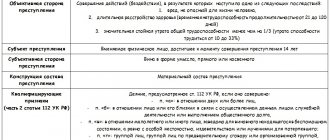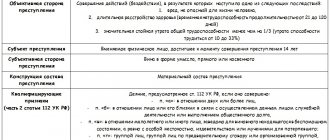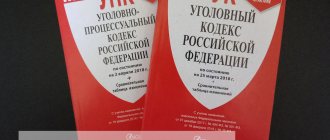Prices for legal services in criminal cases
Many types of illegal actions falling under the jurisdiction of the Criminal Code of the Russian Federation involve violence, which poses a threat to human health. Such actions are socially dangerous, since they carry an element of encroachment on the most fundamental value of any person, which constitutes his well-being. But the health of any person is not only his value, but also a public property. Therefore, society, represented by the state, protecting the rights of citizens and its property, establishes liability for causing mild bodily harm. Punishment for such acts is regulated by Article of the Criminal Code No. 115. Every citizen should know his rights and the procedure to follow if he has been slightly injured in order to bring the perpetrator to justice.
Types of mild injuries
In practice, forensic experts distinguish the following types of mild injuries:
- abrasions;
- significant bruises of the limbs;
- bruises of the soft tissues of the face;
- brain concussion;
- minor bodily injuries;
- head bruises.
Each examination is carried out on an individual basis. The diagnosis is made based on personal characteristics and a general examination of the victim.
Liability under Article 115 of the Criminal Code of the Russian Federation
A guilty person who has committed a crime under Art. 115 of the Criminal Code of the Russian Federation, which caused the health disorder of the injured party, entails the following types of punishment:
- Fine. The maximum amount of penalties is 40 thousand rubles. Also, the amount of the fine is determined based on the indicator of remuneration for labor activity or other types of income.
- Correctional work. The court sets a period for performing correctional work, which does not exceed 1 year.
- Mandatory work. The maximum number of hours a guilty person can perform compulsory work is 48 hours.
- Arrest. The court makes a decision on arrest for a period of up to 4 months.
If mild harm to health is caused due to hooligan motives, national, racial hatred or divergent views on religion, politics, ideology, the guilty person is held accountable:
- Correctional labor (up to 1 year).
- Mandatory work (up to 360 hours).
- Forced labor (up to 2 years).
- Arrest (up to 6 months).
- Restriction of freedom (up to 2 years).
- Imprisonment (up to 2 years).
An analysis of the practice of court decisions shows that the bulk of appeals under Part 1 of Art. 115 of the Criminal Code of Russia ultimately leads to reconciliation of the parties. The basis for termination of proceedings is a statement from the injured party, which states the desire to reconcile with the guilty party.
What is considered minor bodily injury?
The answer to the question of what consequences of an offense can be considered minor bodily harm is clearly given by Article 115 of the Criminal Code of Russia. According to it, mild damage is characterized by:
- short-term health disorder;
- persistent minor loss of ability to work for up to 21 days.
At the same time, beatings or violent acts causing pain, if they did not lead to health problems and loss of ability to work, do not fall under this article. For them, another article 116 is highlighted in the code. In order to qualify a case as causing slight bodily harm, the following may occur:
- fractures of the limbs with the application of plaster or ribs;
- concussions;
- wounds requiring stitches;
- fractures of the nose or facial bones;
- disruption of internal organs due to criminal exposure to chemicals;
- disturbances in the functioning of the cardiovascular or nervous system as a result of psychological influence.
Damage to health due to negligence
In accordance with the norms of the Criminal Code of the Russian Federation, mild harm caused by negligence does not provide for liability. Negligence means committing unlawful acts without intent to cause bodily harm to third parties.
Example
Two comrades V. and D. decided to drink an alcoholic drink when they met. After consuming a significant amount, a conflict arose between the men. During the quarrel, V. pushed his friend, and when he fell, he hit his head on the table. A forensic medical examination showed that citizen D. had a severe bruise in the temporal part of his head. Such a bruise is a mild form of bodily injury. The court of first instance decided to impose a fine in the amount of thirty thousand rubles. The verdict was later overturned by the panel of judges. The resolution of the board displays information that citizen V. did not intend to cause bodily harm through his actions. At the moment the friend was pushed, he could not imagine the consequences in the form of harm to health. There is no intent in the actions of citizen V.
Objective and subjective signs of the committed act
Signs of an objective property include the very fact of physical injury or temporary loss of ability to work, evidence of which can only be a medical examination of the victim.
Subjective factors reflect the personality of the attacker and the circumstances of his offense. These include:
- motives for the crime;
- the relationship between the victim and the accused, until the moment of their conflict;
- the goals that the suspect wanted to achieve by committing criminal acts;
- subjective assessment by the accused of the unlawful acts he has committed;
- psychological characteristics of the accused.
Based on these signs, the court makes a decision on the social danger of the committed acts and selects a preventive measure for the guilty party.
The accident caused minor injuries
The norms of criminal law do not regulate actions during a traffic accident, subsequently which a third party receives minor bodily injuries. In such cases, the norms of the Code of Administrative Offenses of Russia are applied. The act has an administrative nature if the deterioration of a person’s health after an accident occurred due to the negligence of the guilty person. Illegal actions committed intentionally are classified as a criminal offense.
Example
Citizen A., while driving a vehicle in reverse, ran into citizen S. at a crosswalk. A. explained his actions as a result of the lack of visibility while driving. As a result of the collision, the person received minor injuries. The injured party was refused to initiate criminal proceedings. Representatives of government agencies argued the refusal by the lack of intentionality in A.’s actions, committed through negligence.
Termination of a criminal case under Art. 115 of the Criminal Code of the Russian Federation
My client asked for help in the following criminal case. A statement was written against him and submitted to the magistrate's court, where he was accused of committing a crime under Part 1 of Art. 115 of the Criminal Code of the Russian Federation “Intentional infliction of minor harm to health.”
According to the victim, the harm caused to him led to temporary loss of ability to work. He outlined the circumstances that led to his health disorder in his complaint. The examination was carried out at the inquiry stage (which is generally a rare occurrence, but the fact remains a fact).
Concept and qualifying characteristics
Causing minor harm to health is the least socially dangerous offense compared to other crimes related to causing harm to health. For example, such as intentional infliction of grievous harm to health, harm to health of moderate severity. This is probably why the legislator classified this crime as a matter of private prosecution. That is, the injured person must himself apply for criminal prosecution to the magistrate. The exception is for persons who, due to age, illness, etc., themselves do not have the opportunity to apply to the court and bring the person to criminal responsibility. In such cases, such responsibility lies with the prosecutor, who initiates a pre-investigation check and, if necessary, instructs the investigator to initiate a criminal case. In addition, if a person’s actions show signs of a crime provided for in Part 2 of Article 115 of the Criminal Code of the Russian Federation, a criminal case is also initiated by the inquiry body, and not by the applicant.
Let us analyze the qualifying features of Article 115 of the Criminal Code of the Russian Federation. This is infliction of slight harm to health committed:
- for hooligan reasons;
- for reasons of political, ideological, racial, national or religious hatred or enmity, or for reasons of hatred or enmity towards any social group.
As is known, hooligan motives are the actions of a person without any motive to commit a crime; he acts spontaneously, under a fictitious pretext “just because” he beats the victim.
So, O. was returning home from work in a state of alcoholic intoxication. On the way, he met a previously unfamiliar R. and approached him. Under the pretext of starting a conversation, he began to make complaints to R. about the fact that the latter allegedly walked on the same road with him too often, and thereby disturbed him. After R. began to move away from him, O. struck him at least 4 times on the body and face, after which he fled the crime scene. O.’s actions were correctly qualified as causing minor harm to health, committed out of hooligan motives.
Statement to the police
As is often the case in private prosecution cases, the complaint was initially filed with the police department. Where the employees, having conducted an official examination of the severity of the harm to health, cheerfully refused, due to the lack of corpus delicti. The motivation was logical, they say crimes of this category relate to private prosecution, so please proceed to the magistrate’s court. But in the final part of the resolution, after the large phrase “decided”, the reason for the refusal was based on clause 2 of Part 1 of Art. 24 Code of Criminal Procedure of the Russian Federation.
A criminal case cannot be instituted, and an instituted criminal case is subject to termination on the following grounds: lack of corpus delicti in the act;
Defense of a lawyer in court
Thus, the event indicated by the victim has already been verified and a procedural decision has been made. The issue of bringing my client to criminal liability cannot be considered again until the decision of the inquiry officer is cancelled.
Clause 5, Part 1, Art. tells us this directly. 27 Code of Criminal Procedure of the Russian Federation:
Criminal prosecution against a suspect or accused is terminated on the following grounds:
the presence in relation to the suspect or accused of an unrescinded resolution of the body of inquiry, investigator or prosecutor to terminate the criminal case on the same charge or to refuse to initiate a criminal case;
A corresponding petition to terminate the criminal prosecution was prepared.
Termination of criminal proceedings and prosecution in court
True, I never had time to declare it. At the beginning of the trial, the judge asked the parties if they were ready to end the case with reconciliation. To which we refused, in addition I said that in general in the case there is an unreversed decision to refuse to initiate a criminal case, and this process, in principle, is subject to termination.
Then the court, on its own initiative, raised the issue of terminating the criminal proceedings. Naturally, we did not object; for us it was not fundamentally important on whose initiative the criminal case would be terminated. I was quite happy with the option that the court “showed vigilance” and discovered it itself.
For the applicant and his lawyer, it was a shock, because they personally attached the ill-fated decision to refuse as an attachment to the application.
As practice shows, everyone initially goes to the police under Article 115 of the Criminal Code of the Russian Federation. And only then, with a refusal, are they sent to the magistrate’s court. And magistrates' courts, for the most part, sometimes make unlawful verdicts, imposing punishment when the case should have been dismissed altogether.
Cancellation of the sentence under Part 1 of Art. 119 of the Criminal Code of the Russian Federation and part 2 of Art. 115 of the Criminal Code of the Russian Federation.
A domestic dispute ended with one person attacking another with a knife, inflicting nine stab wounds.
By some miracle, the victim remained alive; an ambulance and the police arrived quickly enough. In this case, I took the side of the victim.
The examination showed slight harm to health:
“... a non-penetrating stab wound of the anterior abdominal wall with damage along the wound canal of the subcutaneous fatty tissue, intercostal muscles, a non-penetrating stab wound of the lumbar region on the left with damage along the wound canal of the muscles of the lumbar region, a non-penetrating stab wound of the lumbar region on the left, stab wound on the outer surface of the left shoulder (depth of the wound channel 2.5 cm), stab wound on the outer surface of the left shoulder (depth of the wound channel 3 cm), stab wound on the inner surface of the right thigh on the border of the upper middle thirds with damage along the wound channel of the subcutaneous fatty tissue, a stab wound on the inner surface of the right thigh at the border of the upper and middle thirds with damage along the wound channel of the subcutaneous fatty tissue, which, both in the aggregate and each individually, are qualified as slight harm health on the basis of a short-term health disorder lasting up to three weeks from the moment of injury (up to 21 days inclusive),... a superficial stab wound of the soft palate on the right in the area of the pterygomandibular fold... abrasions in the area of the corner of the mouth on the left, on the mucous membrane of the oral cavity in areas of the alveolar process of the upper jaw at the level of the sixth tooth of the upper jaw on the left, which did not cause harm to health..."
Problems of differentiation from other elements of crime
The main problem is to distinguish between intentional harm and unintentional harm. This is decided by the provision of evidence from the applicant and the accused. In addition, there are the following options:
- the absence of general signs of the subjective side, object, objective side, but the presence of such applies to the subject. Subject is defined as a person who has reached the age of 16.
Basically, from the age of 16, responsibility for most criminal offenses begins, with the exception of particularly cruel ones.For example, murder or the infliction of intentional bodily harm of moderate or severe degree, so this sign will coincide in many cases, accordingly, delimitation will most likely not occur based on such signs.
- Presence of most common features. For a complete explanation, let’s compare two articles: 115 of the Criminal Code (inflicting minor injuries intentionally) and 112 of the Criminal Code (inflicting moderate injuries intentionally).
Almost everything in them coincides, the only exception is the degree of damage caused. And accordingly, various medical signs, such as the duration of treatment, loss of ability to work, etc. Such similarity is usually called adjacent; delimitation often causes difficulties, since the Criminal Code of the Russian Federation contains many related crimes. - The presence of minimal common features. Let's compare several articles: 113 of the Criminal Code of the Russian Federation (infliction of moderate harm to health in a state of passion) and 115 (intentional infliction of minor harm).
Their main common feature is health disorder. There are much more differences: the first case is carried out in a state of passion, the second intentionally, the degree of damage is different, the age at which responsibility begins, and so on. In this case, it is quite easy to distinguish it from other crimes.
Examples
Case 1
Citizen Melnikov K.L. I was driving along the main road in my car. Another car, the driver of which did not consider it necessary to let Melnikov through, flies into the vehicle, as a result - an accident occurs.
K.L. Melnikov was not injured, as he was wearing a seat belt, but the culprit of the traffic accident received two minor bruises and a dislocation. The injuries were classified as minor harm to health.
If his guilt is not refuted, he may face a fine of up to 40 thousand rubles, or arrest of up to 4 months, or correctional labor of up to a year, or community service of up to 480 hours, or a fine of three salaries.
Case 2
Citizen A.P. Konkova was in the office, at her workplace. Leaving her office, she completely accidentally “knocked” the visitor’s door, since he was walking past the doorway just at the very moment when Konkova came out.
The incident was classified as minor injuries, revealing a hematoma on the victim's forehead. If there are security cameras in the office and there was at least one witness during the collision, then she will not bear any responsibility, the maximum that she faces is payment for financial and moral damage.
If she does not prove her innocence, then she faces the same thing as in the case of K.L. Melnikov: a fine of up to 40 thousand rubles, or arrest of up to 4 months, or correctional labor of up to a year, or community service of up to 480 hours, or a fine of three salaries.
Initiation of a criminal case under Part 2 of Art. 115 of the Criminal Code of the Russian Federation
On this basis, the police opened a criminal case under Part 2 of Art. 115 of the Criminal Code of the Russian Federation and Part 1 of Art. 119 of the Criminal Code of the Russian Federation. The victim did not agree with this; he believed that there had been an attempted murder, part 3 of Art. 30, part 1 art. 105 of the Criminal Code of the Russian Federation. One of the stab wounds was inflicted on the upper palate of the mouth, where the accused inserted the knife blade. And only by a fortunate coincidence of circumstances he was unable to push the knife deeper and inflict wounds incompatible with life. One piece of evidence of the defendant's intentions was the fact that the death threat was made out loud immediately before the attack.
All of our requests for retraining were rejected at the inquiry stage. The case was sent to the prosecutor's office and then to court.
In court, the defendant did not admit guilt, considering it a mutual fight, but we insisted that it was an attempted murder, asked to return the case to the prosecutor's office, and stated that the classification was incorrect.
The magistrate, on the whole, did not really want to bother with this case; it was clear that he did not like the process in no particular order (to which all magistrates were very accustomed). Therefore, in about 3-4 sessions we moved on to the debate and verdict.
The verdict did not suit us. The accused was found guilty of committing crimes under Part 1 of Art. 119, paragraph “c”, part 2 of Art. 115 of the Criminal Code of the Russian Federation, and he was sentenced: under clause “c”, part 2 of Art. 115 of the Criminal Code of the Russian Federation – 250 (two hundred fifty) hours of compulsory work; according to Part 1 of Art. 119 of the Criminal Code of the Russian Federation - in the form of 1 (one) year of restriction of freedom.
Based on Part 2 of Art. 69 of the Criminal Code of the Russian Federation by absorbing a less severe punishment with a more severe one, the final punishment in this criminal case was 1 (one) year of restriction of freedom
What to do if you suffer minor injuries
Whether the inflicted bodily injury can be classified as minor is decided only on the basis of a medical report, which is issued only upon a referral from law enforcement agencies. The procedure in such a situation should be as follows:
- calling a police patrol to the scene of the incident or contacting the local police department;
- filing a statement of violation and receiving a referral to a medical examination;
- passing a medical examination;
- waiting for a summons to the court where the case will be heard.
It must be taken into account that the party at fault for causing minor injuries may file a counterclaim, which has often happened in judicial practice. Therefore, it is best to contact an experienced lawyer for legally competent support of the case in court. After all, in cases related to this offense, a free government lawyer is not provided.
In addition, the participation of an experienced and knowledgeable lawyer in the case will help to demand financial compensation from the perpetrator for the moral suffering of the victim. The lawyer will tell you how much you can realistically request for compensation for moral damage, because the court most often never fully satisfies the requests of the injured party.
The victim has the right to suspend legal proceedings upon reconciliation of the parties, but only until the court retires to the deliberation room.
Punishing the perpetrators of such a crime is a rather complex process in which the court always seeks not to protect the interests of the injured party, but to establish the truth. Therefore, the victim must evaluate the available evidence in advance.
Author of the article
Dmitry Leonov
Work experience 15 years, specialization - housing, family, inheritance, land, criminal cases.
Author's rating
721
Articles written
712
about the author
Useful information on criminal cases
- What to do if your husband beat you?
- Beating up a policeman
- The procedure for removing beatings
- Article for beating a minor child
- Causing minor harm to health
- Statement of battery - sample
- Husband threatens physical harm and murder
- If a person threatens violence, what to do?
- Where to go if a child is beaten at school
- How to write a statement to the police about beating
- Causing grievous bodily harm
- Expertise of beatings
- Criminal liability for kidnapping
- Assault by a group of persons
- Exceeding permissible self-defense - article
- Injury at work: what should an employee do?
- Punishment for beatings
- Limits of Necessary Defense
- Unintentional injury to health
- Infliction of moderate bodily harm



